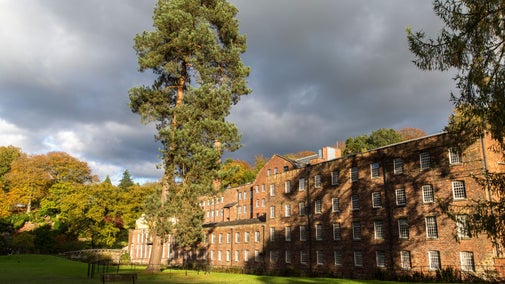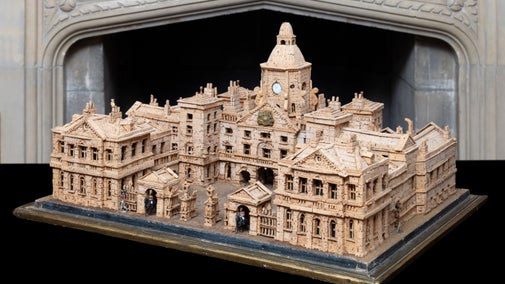
Quarry Bank's collections
Explore the objects and works of art we care for at Quarry Bank on the National Trust Collections website.

Quarry Bank houses thousands of objects and papers which document the stories of an early Industrial Revolution community.
From pieces of miniature railway, swords and axes to fancy-dress costumes. There's even a maypole that is over a hundred years old.
Collected by a past family and bygone workers, there's more than 200 years worth of artefacts. You'll find a staggering collection of private papers from five generations of the Greg family. Also here are the records of almost everybody who ever worked here. In addition are large collections of photographs, maps, plans, and oral histories.

Inside the Workers' Library were hundreds of books enjoyed by the mill workers and residents of Styal village in the early 20th century.
The Greg family, as keen promoters of the Temperance movement, wanted to promote the literacy of the mill workers over any temptations towards alcohol. The Workers' Library was opened by Henry Greg in 1900, and was housed in a Club Room in the village.
The collection at Quarry Bank now contains 260 books, yet a 1920s catalogue lists 487 books. Minutes from the Club Committee shows £10 a year was donated to build the collection (around £500 in today’s money). The cost of books was usually well outside the means of most working class readers.
The first borrowing book covers the period from the first loan in November 1901 to March 1915, during which time there were 3,810 loans taken out, more than five a week.

The archive also houses an extensive collection of machines and apparatus used to test the quality of yarn and cloth.
The testing of incoming and outgoing yarn and cloth was important to all mills. It helped to identify irregularities, minimise potential losses and ensure that yarn bought in for weaving was of the required quality. Quarry Bank's testing room was located next to the financial heart of the mill, it demonstrated the importance of the textile testing process. Testing was an important thing to protect the reputation of the mill within the Lancashire cotton industry.

Explore the objects and works of art we care for at Quarry Bank on the National Trust Collections website.
Uncover the story of Quarry Bank, once one of the largest cotton manufacturers in the world and home to a complete Industrial Revolution community.

In collaboration with Findmypast, we've been exploring the 1921 Census of England and Wales. It's helped us get closer to the lives at Quarry Bank, where we've been able to trace the community and family relationships between the Styal residents and the cotton mill. Discover more about these stories, as well as research from nine other places in our care. By clicking this link, you'll enter a third-party operator's website, Findmypast. Please see their separate privacy policy on how they handle your data.

See the breadth of our collection of works of art, furniture and more: we care for around a million objects at over 200 historic places, there’s a surprise discovery around every corner.

Discover the stories behind some of the greatest artworks and artefacts looked after by the National Trust, as told in a dedicated book, 125 Treasures from the Collections of the National Trust.

The art and heritage collections we care for rival the world’s greatest museums. Learn more about the collection of paintings, decorative art, costume, books, household and other objects at historic places.
